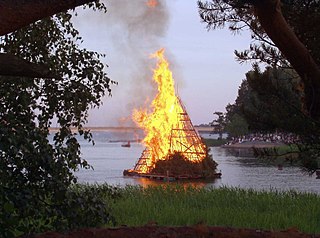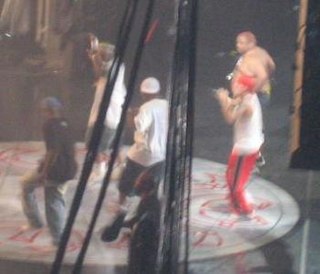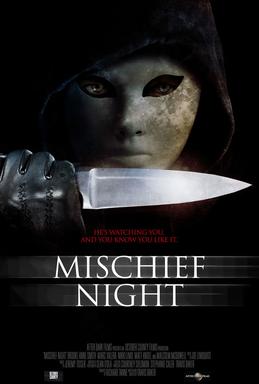Devil's Night is a name associated with October 30, the night before Halloween, in Detroit, MI and the surrounding area. It is related to the "Mischief Night", an informal holiday involving pranks and minor vandalism. However, Devil's Night, especially from the late 1960s to the 1990s, [1] involved widespread serious vandalism and arson in the Detroit area. The community responded by promoting "Angels' Night", a peaceful alternative to Devil's Night. Beginning in the 1990s, the rate of arson began to fall, thanks in part to these community programs.
Devil's Night made its way to Detroit in the 1930s and 1940s. [2] Traditionally, city youths engaged in a night of mischievous or petty criminal behavior, usually consisting of minor pranks or acts of mild vandalism (such as egging, soaping or waxing windows and doors, leaving rotten vegetables or flaming bags of canine feces on stoops, or toilet papering trees and shrubs) which caused little or no property damage. By the 1970s, the concept of Devil's Night as a phenomenon of a night of mischief and vandalism had spread, in a limited way, to cities around the state of Michigan, around the Midwest, and, in some instances, a few other cities around the country.
However, in Detroit in the early 1970s, the vandalism escalated to more destructive acts such as arson. This primarily took place in the inner city, but surrounding suburbs were often affected as well.
The crimes became more destructive in Detroit's inner-city neighborhoods, and included hundreds of acts of arson and vandalism every year. The destruction was worst in the mid- to late-1980s, with more than 800 fires set in 1984, and a number in the hundreds for each subsequent year until 2011. [3] The damage was exacerbated by the severe population decline and widespread abandonment of buildings that occurred in Detroit during the 1970s and 1980s.
Devil's Night arson in Detroit had not declined by the early 1990s. [4] After a brutal Devil's Night in 1994, mayor Dennis Archer promised city residents arson would not be tolerated. In 1995, Detroit city officials organized and established Angels' Night on and around October 29–31. Each year as many as 50,000 volunteers gather to patrol neighborhoods in the city. [5] [6] Many volunteers kept a high profile, patrolling neighborhoods with magnetic-mount flashing amber beacons on their personal vehicles, along with communicating with command centers via CB radios or by cellular phones to report any suspicious activity. Incidences of arson and other crimes declined, a success largely attributed to the Angels' Night volunteers. The drop in reported fires for the year 2008 was credited to the Angels' Night program. [7] That same year, 35,000 signed up to volunteer in the city, according to Daniel Cherrin, spokesperson for Detroit Mayor Ken Cockrel Jr. [8] [9]
As a result of the efforts, the number of fires decreased to near-ordinary levels in the first decade of the 21st century. In 2010, the number of reported fires increased to 169, a 42 percent increase compared to the previous year. [10] However, subsequent years saw the totals again decline to the low 90s for the three-day period. This average of about 32 fires per day is somewhat higher than the expected 26 fires per day through the year. [11] [12] [13] 2015 saw the lowest recorded number of fires with only 52 fires recorded and only 24 considered possibly arson. [14]
By the end of the 2010s, the destructive elements of Devil's Night in Detroit had largely ceased to exist. In 2018, formal support of Angels' Night was ended with city resources being instead allocated to host neighborhood Halloween parties. Devil's Night 2018 recorded a total of five structure fires, with only four on the night before. [15] Devil's Night 2021 saw the lowest totals in multiple decades, with only three structure fires recorded. [16]
In the 2010s, the decline of Devil's Night fires coincided with an increase in similar arson on the nights surrounding the July 4 Independence Day holiday. [17]

Halloween or Hallowe'en is a celebration observed in many countries on 31 October, the eve of the Western Christian feast of All Hallows' Day. It is at the beginning of the observance of Allhallowtide, the time in the liturgical year dedicated to remembering the dead, including saints (hallows), martyrs, and all the faithful departed. In popular culture, the day has become a celebration of horror, being associated with the macabre and supernatural.

Trick-or-treating is a traditional Halloween custom for children and adults in some countries. During the evening of Halloween, on October 31, people in costumes travel from house to house, asking for treats with the phrase "trick or treat". The "treat" is some form of confectionery, usually candy/sweets, although in some cultures money is given instead. The "trick" refers to a threat, usually idle, to perform mischief on the resident(s) or their property if no treat is given. Some people signal that they are willing to hand out treats by putting up Halloween decorations outside their doors; houses may also leave their porch lights on as a universal indicator that they have candy; some simply leave treats available on their porches for the children to take freely, on the honor system.

Halloween costumes are costumes worn on Halloween, a festival which falls on October 31.

A bonfire is a large and controlled outdoor fire, used either for informal disposal of burnable waste material or as part of a celebration.

Midsummer is a celebration of the season of summer usually held at a date around the summer solstice. A variety of traditions have developed, linked to regions as well as religious practice.

D12 was an American hip hop collective from Detroit, Michigan. Formed in 1996, the group achieved mainstream success with its lineup of de facto leader Eminem, Proof, Bizarre, Mr. Porter, Kuniva and Swifty McVay.

Poisoned candy myths are urban legends about malevolent strangers intentionally hiding poisons, drugs, or sharp objects such as razor blades in candy, which they then distribute with the intent of harming random children, especially during Halloween trick-or-treating. These myths, originating in the United States, serve as modern cautionary tales to children and parents and repeat two themes that are common in urban legends: danger to children and contamination of food.

Mischief Night is an informal holiday on which children, teenagers and adults engage in jokes, pranks, vandalism, or parties. It is known by a variety of names including Devil's Night, Gate Night, Goosey Night, Moving Night, Cabbage Night, Mystery Night and Mat Night.

David Bing is an American former professional basketball player, businessman, and politician who served as the 74th mayor of Detroit, Michigan from 2009 to 2014. He is a member of the Democratic Party.
Anti-abortion violence is violence committed against individuals and organizations that perform abortions or provide abortion counseling. Incidents of violence have included destruction of property, including vandalism; crimes against people, including kidnapping, stalking, assault, attempted murder, and murder; and crimes affecting both people and property, as well as arson and terrorism, such as bombings.

Property crime is a category of crime, usually involving private property, that includes, among other crimes, burglary, larceny, theft, motor vehicle theft, arson, shoplifting, and vandalism. Property crime is a crime to obtain money, property, or some other benefit. This may involve force, or the threat of force, in cases like robbery or extortion. Since these crimes are committed in order to enrich the perpetrator they are considered property crimes. Crimes against property are divided into two groups: destroyed property and stolen property. When property is destroyed, it could be called arson or vandalism. Examples of the act of stealing property is robbery or embezzlement.
As of 2018, Detroit had the fourth highest murder rate among major cities in the United States after St. Louis and Baltimore and the 42nd highest murder rate in the world. The rate of robberies in Detroit declined by 67% between 1985 and 2014 while the rate of aggravated assaults increased. As a whole, the city's crime rate has decreased considerably from its 1980s peak.
Beggars Night, or Beggars' Night, is a regional term for the practice of going "Trick or Treat" in the period before Halloween night. Beggars Night emerged to address security concerns over young children involved in unsupervised Trick-or-Treating. Instead, younger children were encouraged to Trick-or-Treat on another night, before Halloween. The chosen date for Beggars Night varies and is typically dependent on the day Halloween falls each year. Beggars Night typically begins after school and often concludes between 6 and 8 pm.

A soul cake, also known as a soulmass-cake, is a small round cake which is traditionally made for Halloween, All Saints' Day and All Souls' Day to commemorate the dead in many Christian traditions. The cakes, often simply referred to as souls, are given out to soulers who go from door to door during the days of Allhallowtide singing and saying prayers "for the souls of the givers and their friends", especially the souls of deceased relatives, thought to be in Purgatory. The practice in England dates to the medieval period, and was continued there until the 1930s. In Sheffield and Cheshire, the custom has continued into modern times. In Lancashire and in the North-east of England soul cakes were known as Harcakes, a kind of thin parkin.

Halloween is a celebration observed on October 31, the day before the feast of All Hallows, also known as Hallowmas or All Saint's Day. The celebrations and observances of this day occur primarily in regions of the Western world, albeit with some traditions varying significantly between geographical areas.
In 2019, 43,686 crimes were reported in the U.S. state of Michigan. Crime statistics vary widely by location. For example, Dearborn has a murder rate of only 2.1 per 100,000 while sharing borders with Detroit and Inkster, some of the highest rates in the state.

Mischief Night is a 2014 American slasher film written and directed by Travis Baker. It stars Brooke Anne Smith, Marc Valera, Nikki Limo, Matt Angel, Erik Palladino, and Malcolm McDowell. The film was produced by Richard Tanne.
Faith Fowler is the senior pastor of Cass Community United Methodist Church and the executive director of Cass Community Social Services (CCSS), a large nonprofit in Detroit that serves more than 700,000 meals a year and houses about 300 homeless people per night alongside a day program, medical clinics, and a job center. CCSS was established as a nonprofit 501 (c) (3) in 2002. Prior to that, many of its programs started as a part of Cass Community United Methodist Church.